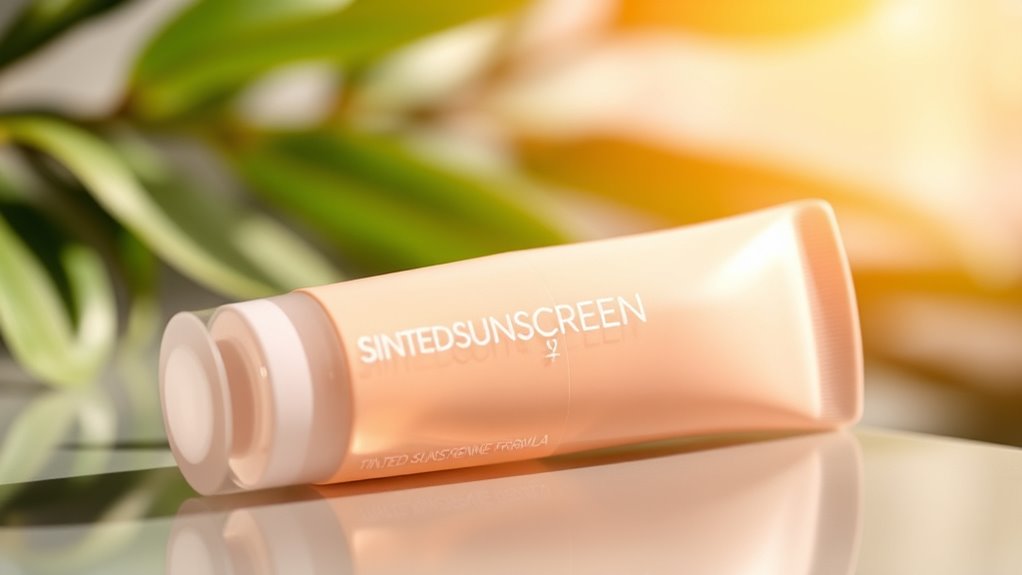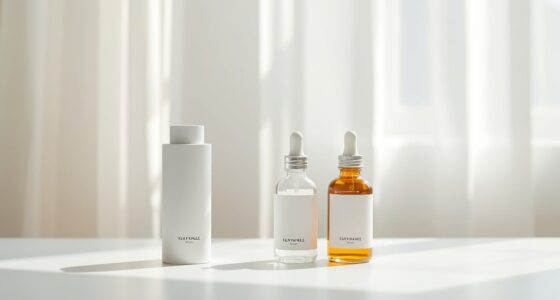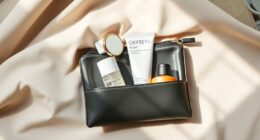Tinted sunscreens have evolved into versatile hybrid formulas that combine strong sun protection with skin-enhancing benefits, making them suitable for all skin types. These products seamlessly blend mineral and chemical filters, offering sheer, natural finishes or more pigmented options, while delivering antioxidants and caring ingredients. They simplify your daily routine by providing both style and safety in one step. If you’re curious about how this innovation can elevate your skincare, there’s more to discover ahead.
Key Takeaways
- Tinted sunscreens have evolved from basic UV protection to versatile, multi-functional products blending SPF with natural tints.
- Hybrid formulas combine chemical and mineral filters for broad-spectrum, stable protection suitable for sensitive skin.
- They offer a range of shades and textures, catering to diverse skin tones and preferences while enhancing natural beauty.
- Modern formulations incorporate skincare ingredients like antioxidants and hyaluronic acid for added skin benefits.
- Continuous innovation improves effectiveness, aesthetics, and ease of daily use, making sun protection seamless for all skin types.

Tinted sunscreens have come a long way from simple UV protection to versatile skincare products that combine sun defense with aesthetic appeal. Today, they serve as an all-in-one solution, blending effective SPF formulas with a natural tint that enhances your complexion. This evolution has made it easier for you to incorporate sun protection into your daily routine without sacrificing style or convenience. Modern tinted sunscreens are designed to cater to all skin types, from sensitive to oily, ensuring everyone can enjoy the benefits of broad-spectrum protection while achieving a flawless look.
Tinted sunscreens blend sun protection with a natural glow for all skin types.
A key development in this evolution is the variety of ingredients used to provide sun protection. You’ll notice two main categories: chemical filters and mineral filters. Chemical filters, such as avobenzone, oxybenzone, and homosalate, work by absorbing UV rays and converting them into heat, which your skin then releases. They tend to be lightweight and blend seamlessly into the skin, making them popular in tinted formulas for their sheer finish. However, some people with sensitive skin might find chemical filters irritating, which is where mineral filters come into play. Mineral filters like zinc oxide and titanium dioxide sit on the skin’s surface, reflecting and scattering UV rays away from your skin. They’re often favored for their gentle nature and effectiveness, especially for sensitive or rosacea-prone skin.
The choice between chemical and mineral filters depends on your skin type and concern. Some tinted sunscreens combine both, creating hybrid formulas that optimize protection and aesthetic appeal. These hybrid products offer broad-spectrum defense while maintaining a natural look, which is ideal if you want a subtle tint that enhances your natural skin tone. They also tend to be more stable under sunlight, providing reliable protection throughout the day. Whether you prefer chemical filters for their lightweight feel or mineral filters for their soothing qualities, modern formulations aim to deliver both performance and a skin-friendly experience.
As the market has evolved, so has the diversity of shades and textures available. From sheer, dewy finishes to more pigmented options, tinted sunscreens now cater to a variety of preferences and skin tones. This advancement means you can find a product that not only protects your skin but also complements your style and daily needs. The integration of skincare ingredients like antioxidants, hyaluronic acid, and niacinamide into these formulas further enhances their appeal, offering additional benefits beyond sun protection. Overall, the ongoing innovation in tinted sunscreens means you don’t have to choose between beauty and safety—modern hybrid formulas make it possible to enjoy both, seamlessly blending protection with a polished appearance.
Frequently Asked Questions
Can Tinted Sunscreens Replace Daily Moisturizer?
Tinted sunscreens can’t fully replace your daily moisturizer because they lack the moisturizer consistency needed for deep hydration. While they offer sun protection and a light coverage, you still need a dedicated moisturizer for nourishing your skin and maintaining a healthy moisture barrier. Use tinted sunscreen as part of your daily skincare routine, but keep your moisturizer nearby to guarantee your skin stays hydrated and protected all day.
Are Hybrid Formulas Suitable for Sensitive Skin?
Did you know that 30% of people with sensitive skin experience irritation from standard sunscreens? Hybrid formulas are generally suitable for sensitive skin, especially if you choose hypoallergenic options and fragrance-free formulas. These products are designed to minimize irritation, making them a good choice for daily wear. Always check labels and patch test new products to guarantee they work well with your skin’s unique needs.
How Long Does Tinted Sunscreen Last During the Day?
Tinted sunscreen typically lasts about 2 to 4 hours during the day, depending on your activity level and skin type. To maintain protection, you should reapply every two hours, especially after sweating or swimming. For better application longevity, use a gentle patting motion rather than rubbing, and consider setting it with a light powder. Reapplication tips like carrying a travel-sized bottle can help you stay protected all day.
Do Tinted Sunscreens Provide Enough Sun Protection Alone?
Did you know that over 80% of UV rays can penetrate your skin even with tinted sunscreen? While tinted sunscreens offer some protection, relying solely on them isn’t enough. They come in a variety of shades and work best when you apply them properly, using techniques like even layer spreading. For maximum defense, combine tinted sunscreen with other sun protection methods, like seeking shade and wearing protective clothing.
Are There Any Mineral-Based Hybrid Tinted Sunscreens?
Yes, there are mineral-based hybrid tinted sunscreens available. These mineral hybrids combine zinc oxide or titanium dioxide with other skin-nourishing ingredients, offering tinted formulations that provide both sun protection and a touch of color. You’ll find them suitable for various skin types, delivering a natural finish while shielding you from UV rays. Look for products labeled as mineral hybrids with tinted formulations to enjoy effective, skin-friendly sun protection.
Conclusion
As you embrace the evolution of tinted sunscreens, think of them as your skin’s new best friend—a versatile canvas that shields, enhances, and adapts to your unique tone. These hybrid formulas are like a chameleon, blending seamlessly into all skin types and tones. So, go ahead, pick your perfect shade and let your skin glow confidently, knowing you’re protected by a formula that’s as dynamic and radiant as you are.







